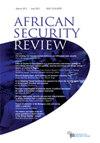Uncovering the processes and ritual practices of indigenous conflict resolution in the shimgelina system
IF 1.1
Q3 INTERNATIONAL RELATIONS
引用次数: 2
Abstract
ABSTRACT Despite the availability of numerous studies on the issue of indigenous conflict resolution mechanisms, the process and ritual practices have not been explored in detail. Thus, the objective of this study is to examine the process and ritual practices during conflict resolution by shimgelina. To achieve these objectives, the study involved fourteen purposely selected shimageles and five conflicting parties for in-depth interviews, and three key informants. Personal observation and document reviews were used to collect data. In addition, one Focus Group Discussion, containing seven Idir leaders, was held to generate rich data about the issue. Thematic categorisation and analysis were used to examine the collected data. This study reveals that shimageles are employing a series of processes of conflict resolution with different ritual practices. Furthermore, this study argues that each ritual practice has its own importance in the process of conflict resolution. Despite the existence of different rituals that are important for conflict resolution and transformation, the shimageles and conflicting parties have fewer adherences to those ritual practices. Therefore, the study recommends that unless the rituals which are important for conflict resolution are strictly followed, the capacity of the shimageles to perform their conflict resolution role is undermined and remains elusive.揭示shimgelina系统中土著冲突解决的过程和仪式实践
摘要尽管有许多关于土著冲突解决机制问题的研究,但尚未对这一过程和仪式实践进行详细探讨。因此,本研究的目的是考察shimgelina解决冲突的过程和仪式实践。为了实现这些目标,这项研究涉及14名有意选择的岛民和5名冲突方进行深入采访,以及3名关键线人。个人观察和文件审查被用来收集数据。此外,还举行了一次由七位Idir领导人参加的焦点小组讨论,以生成有关该问题的丰富数据。专题分类和分析被用来检查收集的数据。这项研究表明,岛民采用了一系列不同仪式实践的冲突解决过程。此外,本研究认为,在冲突解决过程中,每种仪式实践都有其自身的重要性。尽管存在着对解决和转变冲突很重要的不同仪式,但岛民和冲突各方对这些仪式的遵守程度较低。因此,该研究建议,除非严格遵守对解决冲突至关重要的仪式,否则岛民履行解决冲突作用的能力就会受到削弱,而且仍然难以捉摸。
本文章由计算机程序翻译,如有差异,请以英文原文为准。
求助全文
约1分钟内获得全文
求助全文

 求助内容:
求助内容: 应助结果提醒方式:
应助结果提醒方式:


